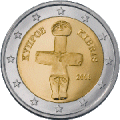The Idol of Pomos is a stone prehistoric sculpture found near the Cypriot village of Pomos. It dates back to the Chalcolithic period, circa the 30th century BC.[1]


The sculpture is on display in the Cyprus Museum in Lefkosia (Nicosia).
Symbolism
editThe sculpture probably represents a woman crouching with her arms spread. The gender is assumed from many similar sculptures found in Cyprus with small protrusions on their chests to indicate the female gender. These figurines were probably used as a fertility symbol. Bleda During, however, suggests that these figurines represent a sort of dance.[2] Smaller versions were worn as amulets around the neck, just as this idol wears (a small copy of) itself.
Euro
editIn 2008 Cyprus adopted the Euro. The Idol, a representation of Cypriot prehistoric art, was chosen to be displayed on the Cypriot euro coins of 1 and 2 euro.[3]
References
edit- ^ "premierdmc.com.cy". Archived from the original on 2012-09-11. Retrieved 2010-02-08.
- ^ During, Bleda (2023). "Reconsidering Cruciform Figurines of Chalcolithic Cyprus". In During, B.S.; Akkermans, P.M.M.G. (eds.). Style and Society in the Prehistory of West Asia: Essays in Honor of Oliver P. Niewenhuyse. Leiden: Sidestone Press. pp. 149–156. Retrieved Aug 4, 2024.
- ^ "nbbmuseum.be". Archived from the original on 2012-03-03. Retrieved 2010-02-08.